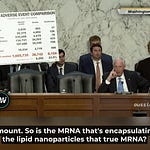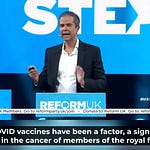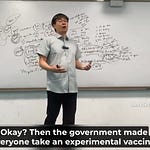On September 12, 2024, Japanese Member of Parliament Ryuhei Kawada led a highly charged emergency press conference in Japan, voicing deep skepticism about the country's upcoming launch of mRNA replicon vaccines, or what some call self-amplifying mRNA vaccines. The event set off alarm bells among critics of government policies, accusing authorities of prioritizing pharmaceutical profits over public health.
What are mRNA Replicon Vaccines?
As you know, mRNA COVID vaccines, like those developed by Pfizer and Moderna for COVID-19, use a small piece of genetic code (mRNA) to instruct your cells to produce a piece of the virus known as the spike protein.
On the other hand, self-amplifying mRNA vaccines, or replicon vaccines, represent a more advanced version where the mRNA not only instructs your cells to produce the spike protein but also makes copies of itself (yay! more mRNA…) once inside the cells.
ARCT-154, scheduled to be administered to the population in October 2024, is a self-amplifying mRNA COVID-19 vaccine from the dynamic duo of Arcturus Therapeutics and Duke-NUS Medical School in Singapore. In Japan, Arcturus Therapeutics found an ally in CSL Seqirus for crafting and distributing their vaccines through a local pharma company called Meiji Seika Pharma.
Arcturus Therapeutics is a biotech company located in San Diego, California, established in 2013. Just like Moderna, which didn't release any products to the market until their mRNA experimental COVID vaccine, Arcturus also hasn't launched any medical products yet, and their self-amplifying mRNA vaccine will be their first.
Arcturus was formed through a merger with Alcobra Pharma, an Israeli pharmaceutical company, after Alcobra faced difficulties during clinical trials, which led to their merger with Arcturus Therapeutics in 2017. Interestingly, Alcobra translates to “The Cobra.” You have to wonder who decided that naming their pharma company after a snake was a good idea. At this point, my eyes are rolling all the way to the back of my head, so I will stop talking about the company’s history here.
The initial testing of the replicon vaccine ARCT-154 took place in Singapore during Phase 1/2 trials, and this early-stage testing was partially funded by a grant from the Singapore government (Archived Source), whose President also happens to be a Board of Trustee for the WEF. You can read more about the unelected WEF official, who voiced his plan to vaccinate the world, here:
The biggest problem the replicon vaccine is that it might infect unvaccinated people through close contact. Listen to Dr. Miki Gibo explain it here:
Here’s the issue: In a study published in Cell, she mentions, scientists looked at how something similar to the replicon mRNA vaccine worked when put into cells. They found that the vaccine parts kept increasing inside the cells. Then, when liquid from these cells, which contains tiny particles, was put onto new cells, the vaccine components spread and moved into these new cells too. This happens because the first cells release little particles called extracellular vesicles, which include exosomes. These particles can carry stuff, like the parts of the vaccine, from one cell to another. In people, these exosomes are found in things like tears, snot, saliva, and sweat. This means there’s a chance that the vaccine parts could pass to other people through bodily fluids.
Back to the Emergency Presss Conference
Japanese Member of Parliament Ryuhei Kawada opened the conference, asserting that the approval process for these vaccines is cause for significant concern. He expressed an urgent need to halt the rollout, stating, "This self-replicating immune agent, scheduled to start regular vaccinations from October 1st 2024, ought to be halted, and I strongly advocate for this action." His strong words highlighted his commitment to putting a stop to what he perceives as a reckless move by health officials.
The MP also underscored the necessity of a comprehensive investigation into the adverse effects of the existing mRNA experimental vaccines. He insisted on transparency from public health officials, stating the need to "ensure thorough investigation and verification to provide relief to mRNA vaccine victims who have suffered significant harm."
Professor Dr. Seiji Kojima, an Emeritus Professor at Nagoya University, heightened concerns by questioning the effectiveness of the existing mRNA vaccines. He criticized the supposed benefits, stating, "The government and proponents of the vaccine claimed there is an infection prevention effect, but it seems that might be a lie." His analysis indicated that even with multiple doses, the data does not show a decrease in mortality rates, which is a primary goal of vaccinations. Kojima pointed out that, disturbingly, data from Hamamatsu City revealed that for individuals in their 80s, the mortality rate was five times higher for those who received two doses compared to those who were unvaccinated. He dramatically characterized the vaccine rollout as "a massacre," highlighting the grave dangers he associates with its broad distribution.
“..the mortality rate was five times higher for those who received two doses compared to those who were unvaccinated..”
“It’s a massacre!”
-Professor Dr. Seiji Kojima
Renowned international journalist and author Mika Tsutomi further fueled the skepticism surrounding the vaccine approval process by highlighting the conflicted interests within the Pharmaceuticals Affairs Council of the Ministry of Health. She noted, "Looking at the members of the Pharmaceutical Affairs Council (of the Ministry of Health) as of last November, 3 out of 16 members have business ties with pharmaceutical companies." This disclosure has intensified public apprehension regarding potential biases in the decision to approve the vaccines.
Dr. Yasufumi Murakami weighed in, warning that introducing the spike protein, found in these vaccines, may pose significant risks due to its toxicity. He referenced numerous studies supporting this claim, adding, "The vaccines do not seem to be effective. They do not work. They lack efficacy. mRNA vaccines have resulted in many deaths, injuries, and victims."
Dr Murakami message was clear—"There is absolutely no need to administer it. There is no need at all. Therefore, knowing this and still administering the vaccine, I believe, is a crime."
"There is absolutely no need to administer it. There is no need at all. Therefore, knowing this and still administering the vaccine, I believe, is a crime."
-Professor Dr. Yasufumi Murakami
The skepticism expressed at this conference resonates with growing public concern about the implications of these vaccines, urging the Japanese government to rethink its next steps.
Next month, Japan has the potential to trigger a worldwide disaster!
Dr. Yasufumi Murakami added to the urgency, warning that "by the beginning of next month, Japan has the potential to trigger a worldwide disaster" if the replicon vaccine rollout proceeds as planned, emphasizing the potential global implications of introducing these replicon vaccines without thorough vetting.
As Japan stands at the precipice of this controversial mRNA replicon vaccine rollout, the voices raised at this meeting illuminate a pressing need for transparency, accountability, and a prioritization of public health over corporate interests. The world watches closely, awaiting Japan's decision on whether it will heed these warnings or proceed as planned, potentially impacting global health policies on a broad scale.
Signing off for now!
A17
Video sourced from tweets from here and here. Thanks Mr. Fujie and Dr. Kenji!











